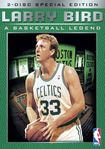 SKC Films Library SKC Films Library |
| SKC Films Library >> Recreation >> Basketball >> Biography |
 Larry
Bird Larry
Birdthe first player ever to shoot at least .500 (.525) from the floor and .900 (.910) from the free-throw line in the same season Larry Joe Bird was born in West Baden, Indiana, on December 7, 1956. He played basketball at Springs Valley High School in French Lick, Indiana, where he became the all-time scoring champion in his senior year. He began his college career at the University of Indiana, but ended it at Indiana State University. ISU went undefeated in Bird's senior year, but lost the NCAA Championship to Michigan State, which was led by a guard named Earvin "Magic" Johnson. Bird was named the 1978-79 College Player of the Year, and left ISU as the fifth-highest scorer in NCAA history. Drafted by the Boston Celtics in 1978, Bird joined the team for the 1979-80 season. The Celtics had had two losing seasons in a row prior to Bird's arrival, but compiled a 61-21 record during Bird's rookie year. Playing in all 82 games, Bird led the team in scoring (21.3 ppg), rebounding (10.4 rpg), steals (143), and minutes played (2,955); he was second in assists (4.5 apg) and three-pointers (58). He was named NBA Rookie of the Year for that season, and made the first of an eventual 12 trips to the NBA All-Star Game. In his second season as a Celtic, Bird once again led the team in points (21.2 ppg), rebounds (10.9), steals (161), and minutes (3,239). By the 1983-84 season, Bird's scoring average had reached the mid-20's, and he was averaging upwards of 7 assists. He was also hitting nearly 90 percent of his free-throw attempts. Voted the NBA's Most Valuable Player for that season, he went on to become only the third man in NBA history to win that honor for three consecutive seasons. He was also named Finals MVP in 1984, with series averages of 27.4 points and 14.0 rebounds. Bird's scoring average continued to rise, reaching 28.7 points in 1984-85. He also achieved his career-best game that season, scoring 60 points against Atlanta. The 1985-86 season saw Bird lead the league in three-pointers (82 and in free-throw percentage (.896), and place in the 10 in three other categories. He was named The Sporting News Man of the Year and the Associated Press Male Athlete of the Year. He won the first-ever three-point shooting competition at the NBA All-Star Weekend. In the NBA Finals against Houston, Bird averaged 24.0 points per game, 9.7 rebounds per game, and 9.5 assists per game. In Game 6 alone he tallied 29 points, 11 rebounds, and 12 assists. Bird still wasn't done amazing basketball fans. During the 1986-87 season he became the first player ever to shoot at least .500 from the floor (.525) and .900 from the free-throw line (.910) in the same season. He accomplished that feat again the following season, shooting .527 from the floor and .916 from the line. In 1987-88, Bird became the first Celtic ever to record a 40-20 game, with a 42-point, 20-rebound effort against Indiana. He averaged a career-high 29.9 points that season. Surgery to remove bone spurs from both heels limited Bird to only six games in 1988-89. He came back the following season to post the third-longest free-throw streak in NBA history, however, hitting 71 consecutive attempts. Back problems caused him to miss 22 games in 1990-91, and another 37 games in 1991-92. His last great performance as a Celtic came in a nationally televised game against Portland in March 1992, scoring 16 points in the fourth quarter, including the Celtics' last nine points and making a game-tying three-pointer with two seconds left. Boston ultimately won the game, 152-148, in double overtime. Bird finished the game with 49 points, 14 rebounds, 12 assists, and 4 steals. In 1992, Bird was a member of the U.S. Olympic Dream Team which dominated the competition at Barcelona. On August 18 of that year, Bird announced his retirement as a player. After 897 games, Bird retired with 21,791 points (24.3 ppg), 8,974 rebounds (10.0), and 5,695 assists (6.3 apg). He had compiled a .496 average from the floor, and a .886 average from the free-throw line. After ending his career as a player, Bird worked as a special assistant in the Celtics' front office, played golf, did some commercials, and appeared in a few films (including Space Jam, with Michael Jordan). On May 12, 1997, he was named head coach of the Indiana Pacers, and held that position for three seasons. Since leaving the coaching ranks in 2000, Bird has had time to follow many of his other interests -- the outdoors, country music, auto racing, golf, the St. Louis Cardinals, and so on. Honors NBA Rookie of the Year (1980) SOURCE |
| SKC Films Library >> Recreation >> Basketball >> Biography This page was last updated on June 26, 2017. |
